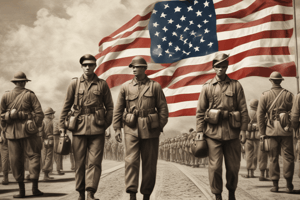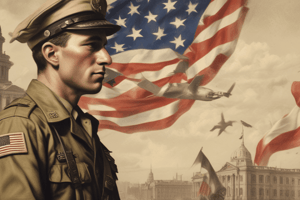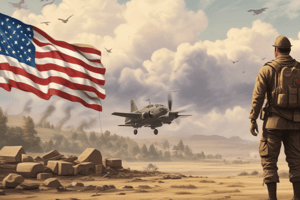Podcast
Questions and Answers
What was the primary purpose of the GI Bill?
What was the primary purpose of the GI Bill?
- To provide benefits for returning WWII veterans (correct)
- To promote suburban living
- To fund the civil rights movement
- To enforce segregation laws
Redlining was a practice that aimed to promote equal housing opportunities for all racial groups.
Redlining was a practice that aimed to promote equal housing opportunities for all racial groups.
False (B)
What was the significance of Brown v. Board of Education?
What was the significance of Brown v. Board of Education?
It declared that racially segregated facilities are unequal and mandated the desegregation of public schools.
The practice of __________ involved middle-class white Americans moving to suburbs, leaving inner cities.
The practice of __________ involved middle-class white Americans moving to suburbs, leaving inner cities.
Match the following key events or terms with their descriptions:
Match the following key events or terms with their descriptions:
Which of the following characterized the experiences of 1950's teenagers?
Which of the following characterized the experiences of 1950's teenagers?
The Jim Crow Laws enforced racial equality in the South.
The Jim Crow Laws enforced racial equality in the South.
Who was Linda Brown and why is she significant?
Who was Linda Brown and why is she significant?
Who was the first African-American girl to attend an all-white elementary school?
Who was the first African-American girl to attend an all-white elementary school?
The Berlin Airlift occurred in 1948 as a response to the Soviet blockade of Berlin.
The Berlin Airlift occurred in 1948 as a response to the Soviet blockade of Berlin.
What was the primary aim of the Marshall Plan?
What was the primary aim of the Marshall Plan?
The _____ theory suggests that if one nation falls to communism, neighboring nations will also fall.
The _____ theory suggests that if one nation falls to communism, neighboring nations will also fall.
Match the following terms with their definitions:
Match the following terms with their definitions:
What was the 38th Parallel?
What was the 38th Parallel?
The term 'Iron Curtain' refers to the political division between the Soviet-dominated East and the U.S.-dominated West.
The term 'Iron Curtain' refers to the political division between the Soviet-dominated East and the U.S.-dominated West.
What event triggered the national civil rights movement in the United States?
What event triggered the national civil rights movement in the United States?
The _____ was launched in 1957 and was the first satellite to orbit the Earth.
The _____ was launched in 1957 and was the first satellite to orbit the Earth.
What did the Truman Doctrine entail?
What did the Truman Doctrine entail?
What was the primary outcome of the Korean War?
What was the primary outcome of the Korean War?
The Marshall Plan provided military support to Eastern European nations.
The Marshall Plan provided military support to Eastern European nations.
Who was the first African-American woman to refuse to give up her seat on a Montgomery bus before Rosa Parks?
Who was the first African-American woman to refuse to give up her seat on a Montgomery bus before Rosa Parks?
The ______ was launched in 1957 and became the first satellite to orbit the Earth.
The ______ was launched in 1957 and became the first satellite to orbit the Earth.
Match the following events with their significance:
Match the following events with their significance:
Which doctrine was primarily aimed at preventing the spread of communism?
Which doctrine was primarily aimed at preventing the spread of communism?
What was a significant impact of the GI Bill?
What was a significant impact of the GI Bill?
McCarthyism was associated with a search for communists in the American government.
McCarthyism was associated with a search for communists in the American government.
Redlining was a practice that promoted equal housing opportunities for all racial groups.
Redlining was a practice that promoted equal housing opportunities for all racial groups.
What was the main purpose of the Montgomery Bus Boycott?
What was the main purpose of the Montgomery Bus Boycott?
What was the primary role of the National Aeronautics Space Act?
What was the primary role of the National Aeronautics Space Act?
_________ was the response by the U.S. to the Soviet blockade of Berlin.
_________ was the response by the U.S. to the Soviet blockade of Berlin.
The term '__________' refers to the mass movement of middle-class white Americans to suburbs during the 1950s.
The term '__________' refers to the mass movement of middle-class white Americans to suburbs during the 1950s.
Which term describes the theory that if one nation falls to communism, neighboring nations will also follow?
Which term describes the theory that if one nation falls to communism, neighboring nations will also follow?
Match the following terms with their descriptions:
Match the following terms with their descriptions:
Which event directly resulted from the case of Brown v. Board of Education?
Which event directly resulted from the case of Brown v. Board of Education?
Emmett Till's murder played a significant role in igniting the civil rights movement.
Emmett Till's murder played a significant role in igniting the civil rights movement.
Who was Linda Brown and what was her contribution to civil rights?
Who was Linda Brown and what was her contribution to civil rights?
The _________ was established primarily to fight against segregation using nonviolent means.
The _________ was established primarily to fight against segregation using nonviolent means.
Match the individuals with their significance:
Match the individuals with their significance:
Flashcards are hidden until you start studying
Study Notes
Post-War Legislation and Housing
- GI Bill provided unemployment compensation, home loans, and tuition for WWII veterans.
- Redlining prevented minority groups from obtaining loans for homes in predominantly white neighborhoods.
- Levittown, developed by William Levitt, symbolized suburban expansion post-WWII and utilized mass production techniques for affordable housing.
Societal Changes in the 1950s
- White Flight occurred as middle-class white Americans moved to suburbs, leaving urban centers.
- Baby Boomers were born from 1946 to 1964, contributing to an increase in population and cultural shifts.
- Conformity defined the social atmosphere, encouraging individuals to align with group norms.
Civil Rights Movement
- 1950's teenagers rebelled against conformity using drugs, alcohol, and rock and roll music.
- Jim Crow Laws legalized segregation in the Southern states, upheld by the Plessy v. Ferguson ruling of "separate but equal."
- Brown v. Board of Education (1954) reversed Plessy, declaring segregated facilities unconstitutional, leading to desegregation in public schools.
- Montgomery Bus Boycott (1955) protested bus segregation in Alabama, highlighting civil disobedience.
- Civil Rights Act of 1957 aimed to eliminate discrimination in voting, ending poll taxes and literacy tests.
Influential Figures
- Linda Brown’s case against segregation in schools was pivotal for civil rights.
- Emmett Till's murder in 1955 brought national attention to racial injustice.
- Claudette Colvin, at age 15, defied segregation laws on a bus before Rosa Parks.
- Rosa Parks' arrest sparked the Montgomery Bus Boycott and national civil rights efforts.
- Little Rock Nine faced resistance as they integrated Central High School, requiring federal intervention for protection.
- Ruby Bridges became the first African-American girl to attend an all-white elementary school, escorted by police.
Cold War Context
- Capitalism emphasizes individual ownership, whereas communism focuses on governmental control and equality.
- Proxy wars involve third parties instead of direct military conflict between opposing powers.
- The Domino theory suggested that the fall of one nation to communism could lead to neighboring countries following suit.
- The 38th Parallel serves as the dividing line between North and South Korea, post-war.
- Iron Curtain described the divide between Soviet-controlled East and the Western democratic nations.
- Truman Doctrine aimed to provide aid to countries at risk of communist takeover.
- Marshall Plan involved $13 billion in aid to rebuild European economies post-WWII.
Military Alliances and Tensions
- Policy of Containment sought to prevent the spread of communism to democratic nations.
- NATO was established in 1949 as a defense alliance among the U.S., Canada, and ten Western European countries.
- Warsaw Pact was formed in reaction to NATO, uniting the Soviet Union and Eastern European nations.
- Brinkmanship described the strategy of pushing dangerous events to the edge of conflict.
- McCarthyism represented a campaign against alleged communists in the U.S. government led by Senator Joseph McCarthy.
Space Exploration
- Sputnik 1 was launched by the USSR in 1957, marking the first artificial satellite in orbit.
- The National Aeronautics Space Act established NASA to oversee American space exploration.
- Explorer 1 was the first U.S. satellite launched in 1958, contributing to the Space Race with the Soviets.
Cultural Landscape
- The 1950s saw television promoting conformity and rendering a significant influence on American culture.
- The Deutschmark became the currency for West Germany as it stabilized post-war.
- The Berlin Airlift (1948) delivered essential supplies to West Berlin during the Soviet blockade.
- East Germany, under Soviet control, remained relatively weak compared to its capitalist counterpart, West Germany.
- The Space Race highlighted competition in technological advancements between the U.S. and the USSR.
- The Arms Race involved military buildup, creating tension between the U.S. and Soviet forces.
- The Korean War resulted in Korea's division along the 38th parallel, with the North as communist and the South as capitalist, leading to public discontent in the U.S.
- The Berlin Blockade restricted access to West Berlin, prompting the Berlin Airlift for supplies.
- Rock and Roll in the 1950s was influenced by Black musical traditions and prominent figures like Little Richard, Chuck Berry, and Elvis, igniting a cultural revolution and counterculture movement.
Post-War Legislation and Housing
- GI Bill provided unemployment compensation, home loans, and tuition for WWII veterans.
- Redlining prevented minority groups from obtaining loans for homes in predominantly white neighborhoods.
- Levittown, developed by William Levitt, symbolized suburban expansion post-WWII and utilized mass production techniques for affordable housing.
Societal Changes in the 1950s
- White Flight occurred as middle-class white Americans moved to suburbs, leaving urban centers.
- Baby Boomers were born from 1946 to 1964, contributing to an increase in population and cultural shifts.
- Conformity defined the social atmosphere, encouraging individuals to align with group norms.
Civil Rights Movement
- 1950's teenagers rebelled against conformity using drugs, alcohol, and rock and roll music.
- Jim Crow Laws legalized segregation in the Southern states, upheld by the Plessy v. Ferguson ruling of "separate but equal."
- Brown v. Board of Education (1954) reversed Plessy, declaring segregated facilities unconstitutional, leading to desegregation in public schools.
- Montgomery Bus Boycott (1955) protested bus segregation in Alabama, highlighting civil disobedience.
- Civil Rights Act of 1957 aimed to eliminate discrimination in voting, ending poll taxes and literacy tests.
Influential Figures
- Linda Brown’s case against segregation in schools was pivotal for civil rights.
- Emmett Till's murder in 1955 brought national attention to racial injustice.
- Claudette Colvin, at age 15, defied segregation laws on a bus before Rosa Parks.
- Rosa Parks' arrest sparked the Montgomery Bus Boycott and national civil rights efforts.
- Little Rock Nine faced resistance as they integrated Central High School, requiring federal intervention for protection.
- Ruby Bridges became the first African-American girl to attend an all-white elementary school, escorted by police.
Cold War Context
- Capitalism emphasizes individual ownership, whereas communism focuses on governmental control and equality.
- Proxy wars involve third parties instead of direct military conflict between opposing powers.
- The Domino theory suggested that the fall of one nation to communism could lead to neighboring countries following suit.
- The 38th Parallel serves as the dividing line between North and South Korea, post-war.
- Iron Curtain described the divide between Soviet-controlled East and the Western democratic nations.
- Truman Doctrine aimed to provide aid to countries at risk of communist takeover.
- Marshall Plan involved $13 billion in aid to rebuild European economies post-WWII.
Military Alliances and Tensions
- Policy of Containment sought to prevent the spread of communism to democratic nations.
- NATO was established in 1949 as a defense alliance among the U.S., Canada, and ten Western European countries.
- Warsaw Pact was formed in reaction to NATO, uniting the Soviet Union and Eastern European nations.
- Brinkmanship described the strategy of pushing dangerous events to the edge of conflict.
- McCarthyism represented a campaign against alleged communists in the U.S. government led by Senator Joseph McCarthy.
Space Exploration
- Sputnik 1 was launched by the USSR in 1957, marking the first artificial satellite in orbit.
- The National Aeronautics Space Act established NASA to oversee American space exploration.
- Explorer 1 was the first U.S. satellite launched in 1958, contributing to the Space Race with the Soviets.
Cultural Landscape
- The 1950s saw television promoting conformity and rendering a significant influence on American culture.
- The Deutschmark became the currency for West Germany as it stabilized post-war.
- The Berlin Airlift (1948) delivered essential supplies to West Berlin during the Soviet blockade.
- East Germany, under Soviet control, remained relatively weak compared to its capitalist counterpart, West Germany.
- The Space Race highlighted competition in technological advancements between the U.S. and the USSR.
- The Arms Race involved military buildup, creating tension between the U.S. and Soviet forces.
- The Korean War resulted in Korea's division along the 38th parallel, with the North as communist and the South as capitalist, leading to public discontent in the U.S.
- The Berlin Blockade restricted access to West Berlin, prompting the Berlin Airlift for supplies.
- Rock and Roll in the 1950s was influenced by Black musical traditions and prominent figures like Little Richard, Chuck Berry, and Elvis, igniting a cultural revolution and counterculture movement.
Studying That Suits You
Use AI to generate personalized quizzes and flashcards to suit your learning preferences.




